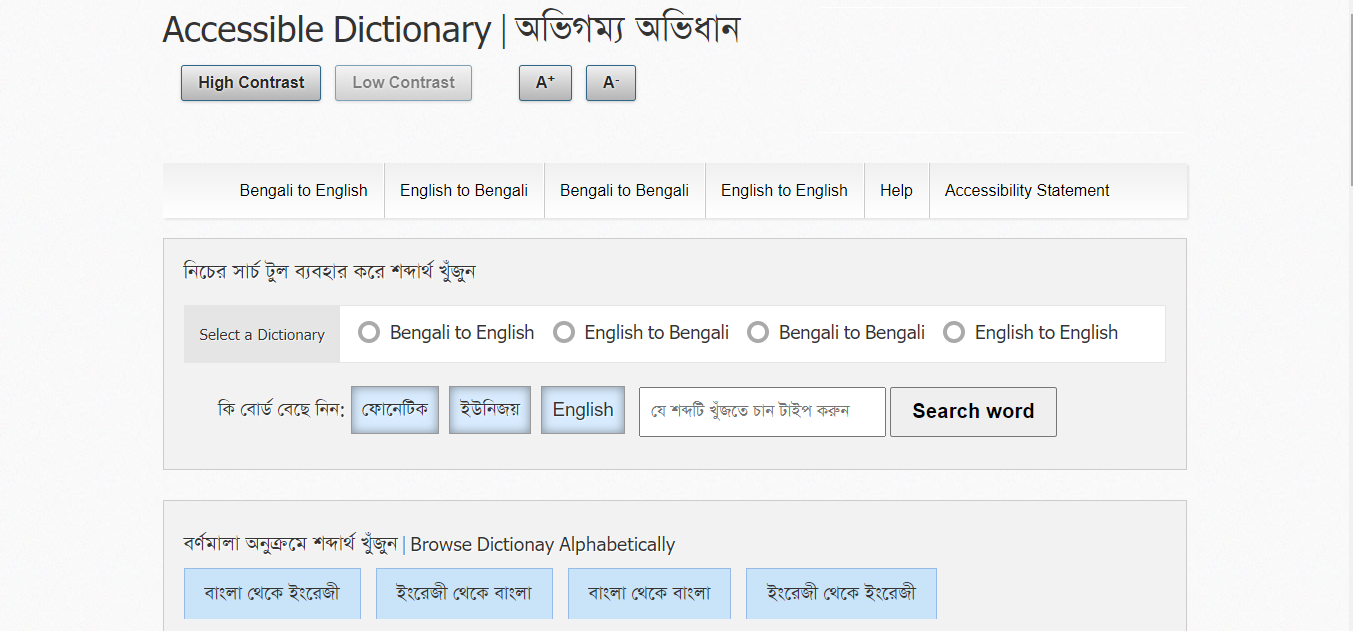 Accessible Dictionary
Inclusive Dictionary for all
Accessible Dictionary
Inclusive Dictionary for all

Challenges
According to the World Health Organization, about 15% of the world's total population is persons with disabilities and about 3 million persons with disabilities in Bangladesh have been registered by the Ministry of Social Welfare (MoSW). Students with disabilities, especially visually impaired students, do not get enough usable educational materials to continue their studies at school, college, and university levels. In the context of the usability of the traditional dictionary, it was very clear that the traditional dictionaries had many limitations and these could not satisfy the learners anymore. Furthermore, persons with disabilities faced more problems using traditional dictionaries and of having physical limitations they had to depend on others to learn new words.
Towards a Solution
Bangladesh is one of the first 20 countries in the world to sign and ratify the UN Convention on the Rights of Persons with Disabilities (UNCRPD) and is committed to achieving the SDG by 2030. According to SDG Goal 4, Accessible Dictionary is ensuring inclusive and equitable quality education and promoting lifelong learning opportunities for all. An accessible Dictionary means a dictionary that is prepared for all types of people and that is easy to approach, enter, use or understand through printable or digital media. Including persons with print disabilities, all people can easily access the dictionary for the fulfillment of their purposes. The Accessible Dictionary is based on a creative and innovative idea that utilizes existing technological prospects and open-sourced technology to raise awareness and reduce the exclusion and discrimination that currently exists. It is available for all, cost-effective, requires less time, and is universally designed so that all can have an easy full-access experience. This Dictionary has stored in national databases and will be available in both online and offline versions. Besides, these dictionaries can be used through computers, mobile phones, and other media. The visually impaired and a largely illiterate population can use this accessible dictionary and text material. This will also reduce the cost of reprinting any type of dictionary. An online and offline dictionary that can be used by all people including the visually impaired. It helps to find the meaning of words in both Bengali and English from trusted sources.
This accessible dictionary is a reflection of the implementation of ‘Persons with Disabilities Rights and Protection Act 2013’ and ‘article-9 & 24 of UNCRPD’. a2i is now working to institutionalize this innovation so that Bangla Academy takes ownership of accessible dictionaries. Since this innovation is hosted by a web-based platform, this initiative can be easily implemented in any region. It’s an innovation for all, it can be implemented in any country by adapting their own language and as model inclusive design. Though it is designed mainly to focus on persons with disability, nearly 6 million people with and without disabilities are using this accessible dictionary.
Considering the situation, with the support of the service innovation fund of a2i, YPSA was working on a project to convert four Accessible Dictionary, Bengali to English, English to Bengali, Bengali to Bengali, English to English which will be available online and offline both for all student including persons with visual and print disability, learning disability and information disadvantaged groups. Under this project, 12000+ pages of the dictionary have been converted into Unicode. In preparing the project, planning meetings were held with the organizations of persons with disabilities (OPD) groups, and students with disabilities together their suggestions. The persons with disabilities were involved in a participatory process to identify problems, required dictionary books, and format. The OPD members, teachers of the Govt. school for the blind, worked hard to interact with the target group, collecting their feedback upon which the project has been designed. 10 people with disabilities were full-time involved in the planning phase up to the implementation stages such as the preparation of an accessible dictionary, promoting the use of a web portal, and implementation, monitoring, and evaluation of the project, etc also engaged by the people with disabilities. Besides, 80% project staff were people with disabilities. The Program Manager was also a person with a disability. In all activities, 50% of participants were women with disabilities. It can easily be said that this project is designed by the Persons with Disability for the Persons with Disability.
Contact Information
Countries involved
Supported by
Implementing Entities
Project Status
Project Period
URL of the practice
Primary SDG
Primary SDG Targets
Secondary SDGs
Secondary SDG Targets
Similar Solutions
| NAME OF SOLUTION | Countries | SDG | Project Status | |
|---|---|---|---|---|
360-Degree Awareness Tool to Fight COVID-19 Raising awareness and ensuring public wellbeing through a one-stop platform for fighting COVID-19 in Bangladesh |
Bangladesh | 16 - Peace and Justice Strong Institutions | Ongoing | View Details |
A-Card Initiative |
Bangladesh | 10 - Reduced Inequalities | Completed | View Details |
Accelerating Digital Transformation in All Ministries in Bangladesh Promoting the rapid design and implementation of plans to digitize all ministries and subordinate government institutions in Bangladesh |
Bangladesh | 10 - Reduced Inequalities | Ongoing | View Details |
Accelerating the Transformational Shift to a Low-Carbon Economy in Mauritius Towards supplying 35 percent of the country’s energy needs with renewables by 2025 |
Bangladesh | 05 - Gender Equality 09 - Industry, Innovation and Infrastructure 13 - Climate Action | Ongoing | View Details |
Accelerator Labs Network Following collective intelligence methods to address emerging sustainability challenges and the growing demand for local solutions |
Bangladesh | 08 - Decent Work and Economic Growth 13 - Climate Action | Ongoing | View Details |
